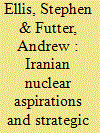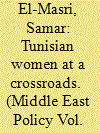|
|
|
Sort Order |
|
|
|
Items / Page
|
|
|
|
|
|
|
| Srl | Item |
| 1 |
ID:
142170


|
|
|
|
|
| Summary/Abstract |
Does the Arab Street hold authoritarian leaders to account for their failures on the battlefield? Sir John Bagot Glubb, the British head of the Arab Legion, noted several years after Israel's War for Independence that it was the “Street” that pushed Arab statesmen to go to war, rather than any clear strategic rationale
|
|
|
|
|
|
|
|
|
|
|
|
|
|
|
|
| 2 |
ID:
142163


|
|
|
|
|
| Summary/Abstract |
Relations between the People's Republic of China (PRC) and the countries of the Gulf have been subjected to an escalating barrage of scholarly scrutiny. At first, academic writing subsumed Beijing's dealings with the Arab Gulf states and Iran into comprehensive surveys of Chinese policy toward the Middle East as a whole. Three landmark monographs fixed the bar for these initial accounts: Yitzhak Shichor's The Middle East in China's Foreign Policy, Hashim Behbehani's China's Foreign Policy in the Arab World and John Calabrese's China's Changing Relations with the Middle East.1 Efforts to situate the PRC's policies toward the Gulf in the context of broader regional developments continue up to the present, as exemplified by Geoffrey Kemp's The East Moves West.2 Such first-generation studies set out to be comprehensive not only geographically, but thematically as well. Attention is usually paid to a wide range of diplomatic, military, economic and cultural trends, albeit with an emphasis on interstate diplomacy.
|
|
|
|
|
|
|
|
|
|
|
|
|
|
|
|
| 3 |
ID:
142164


|
|
|
| 4 |
ID:
142165


|
|
|
|
|
| Summary/Abstract |
With a few notable exceptions,1 it has become almost conventional wisdom to assume that a nuclear Iran is bad for its immediate neighbors, the wider Middle East region, and even the world.2 Such logic suggests that even an Iran with a nascent nuclear program would be emboldened in its meddling in Middle Eastern geopolitical affairs, present a serious, perhaps existential, threat to Israel and others, and could potentially lead to a nuclear-proliferation cascade among its immediate regional rivals. There is almost certainly some truth to these claims — and few people see an Iran armed with nuclear weapons as a good thing or something that should be welcomed. That said, much of the current debate has ignored or glossed over some of the other important geopolitical dynamics that have been driven by Iranian actions during the past decade: actions that have in fact been broadly positive for regional security and stability. As a result, if a comprehensive deal on the nuclear program cannot be reached by the June 30 deadline, the strategic implications of latent or even a nuclear-armed Iran may not be as catastrophic as some have suggested and more subtle than many fear.
|
|
|
|
|
|
|
|
|
|
|
|
|
|
|
|
| 5 |
ID:
142169


|
|
|
|
|
| Summary/Abstract |
In July 2013, the cover of Time magazine announced that Egypt has both the world's “best protesters” and “worst democrats.”1 In the same month, the cover of The Economist asked, “Has the Arab Spring failed?”2 The media oscillated between euphoria over the democratic potential of “Facebook revolutions” and dismissal (or even gloating) when they did not seem to pan out. This response to the Arab uprisings is part of a broader trend. Popular accounts of mass uprisings tend to label them neatly by color (orange, green, rose) or season (spring, winter). They give an oversimplified portrait of mass mobilization as teleological: Protests are “successful” if they quickly bring about a stable democracy, and “failed” if they do not. This is often matched by a fascination over whether protesters are “like us” — by their use of social media, rejection of extremism, embrace of Europe and free markets, or hatred of dictatorship. Indeed, debates about the success or failure of mass uprisings often reflect a problematic obsession with the question of whether protesters are “ready for democracy.”
|
|
|
|
|
|
|
|
|
|
|
|
|
|
|
|
| 6 |
ID:
142161


|
|
|
|
|
| Summary/Abstract |
I want to speak with you today about the Middle East. This is the region where Africa, Asia and Europe come together. It is also the part of the world where we have been most compellingly reminded that some struggles cannot be won, but there are no struggles that cannot be lost.
|
|
|
|
|
|
|
|
|
|
|
|
|
|
|
|
| 7 |
ID:
142166


|
|
|
|
|
| Summary/Abstract |
At the end of 2014, some unexpected news about the “Islamic State” (IS) made headlines: al-Quds al-Arabi reported that a newly created IS military-police department in Raqqa had arrested fighters who had refused to go to battle in Kobani,1 and the Financial Times reported the execution of 100 foreign fighters and the arrest of another 400 trying to flee the war zone.2 Spoiled by its initial success, IS has now suffered some serious military setbacks in Baiji, Sinjar, Kobani, Tikrit and other towns in Iraq and Syria. In this article, I argue that these events are signs of the decline of an organization that has passed the zenith of its power. IS has overreached politically, militarily, and ideologically by proclaiming the renaissance of the Islamic caliphate, by declaring a territorial state to be the nucleus of an eschatological and universal Islamic empire, and by denouncing everybody who does not follow its extremist religious doctrine as an apostate. The loss of territory and centralized command, however, will most probably not mark the group's end; rather it will cause IS to resort to a strategy of terrorist warfare — as it has already done in some attacks in Western capitals — and will lead to its metastasis into countries like Libya, Yemen, Algeria, Pakistan and Egypt.
|
|
|
|
|
|
|
|
|
|
|
|
|
|
|
|
| 8 |
ID:
142167


|
|
|
|
|
| Summary/Abstract |
An estimated 50,000 American and 250,000 British expatriates currently reside in the UAE; around a quarter of them choose to make it their home for periods of five or more years. More than a third of the UAE population is non-Muslim; Christians and Hindus each account for around 15 percent. All faiths can congregate and worship without interference, and interfaith dialogue is encouraged and supported. With Dubai at the forefront and Abu Dhabi having recently instituted a “visitors welcome” campaign, the UAE has become a hugely popular tourist destination, changing the longstanding notion that travel to the Arabian Gulf is only appropriate for the purposes of business and work. Men and women serving in the U.S. Marines and UK Royal Air Force are regularly stationed at the Jebel Ali Port and the Al Minhad Air Base, respectively. The UAE has also participated in virtually every U.S.-led coalition campaign since 1991, making it the most dependable Arab partner of the United States. In fact, by a number of international metrics, it constitutes one of the most secular and “modern” nation states in the Greater Middle East.
|
|
|
|
|
|
|
|
|
|
|
|
|
|
|
|
| 9 |
ID:
142162


|
|
|
|
|
| Summary/Abstract |
With the break-up of the Soviet Union at the end of the Cold War, three republics in the South Caucasus — Georgia, Armenia and Azerbaijan — achieved independence for the second time during the twentieth century (their first experience, following the Russian Revolution, had been contentious and short-lived). Located at the crossroads of Russia, Eastern Europe and the Middle East, the republics have depended for their political and economic security on the balancing of relations with both their regional neighbors and the major powers. Their foreign policy has been shaped by concerns over territorial integrity, ethnic brethren residing abroad, trade routes and historical memory.
|
|
|
|
|
|
|
|
|
|
|
|
|
|
|
|
| 10 |
ID:
142160


|
|
|
|
|
| Summary/Abstract |
n the spring of 2012, I came to Washington for two specific meetings. One was with Senator John Kerry, at the time the chairman of the Senate Foreign Relations Committee. Senator Kerry had also chaired the Senate committee that held my confirmation hearing, and he'd come to Saudi Arabia to visit me on a number of occasions, so I knew him well. That night, I had a private dinner with General David Petraeus, who at the time was head of the CIA. When I was ambassador in Saudi, he was coalition commander in Iraq, and we worked on a number of programs together. My message to both of them was simple and straightforward. Number one, Syria was of critical strategic importance to the United States, and if we wanted to be serious about pushing back the spread of Iranian influence in the region, Syria was key. If we wanted to send a message to Hezbollah, it was through Syria. Finally, from a moral standpoint, this was a true people's revolution. These were common people coming out onto the streets, peacefully protesting, initially, against a repressive regime. If we were going to support any revolution in the Middle East, this should be the one we stand behind.
|
|
|
|
|
|
|
|
|
|
|
|
|
|
|
|
| 11 |
ID:
142168


|
|
|
|
|
| Summary/Abstract |
The role of women in the 2011 wave of protests, demonstrations and riots — nicknamed “the Arab Spring” by the Western media1 — was crucial, but many observers have started wondering whether women's postrevolutionary status will reflect their invaluable contribution. In Tunisia, women have enjoyed and practiced numerous rights since the 1950s. The various measures the state enacted to achieve gender equality have placed the country at the top position in the region with respect to women's rights. While this study acknowledges the impressive Tunisian record and the revolutionary role of Habib Bourguiba, later reinforced by Zine El Abidine Bin Ali, it draws attention to a grim reality. Not only did the two rulers coopt women's organizations into the state and punish feminist dissent; they also used the woman card to please the West and bargain with the Islamists, bolstering those rights when they wanted to weaken the Islamic movement, and ignoring them when they sought to appease it. It is this dependence on the Ben Ali regime and the rise of political Islam that have posed the most serious challenges to women in Tunisia since the Jasmine Revolution of 2011.
|
|
|
|
|
|
|
|
|
|
|
|
|
|
|
|
|
|
|
|
|